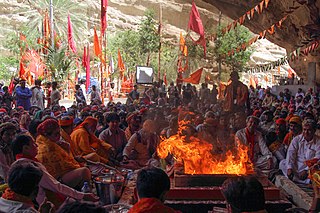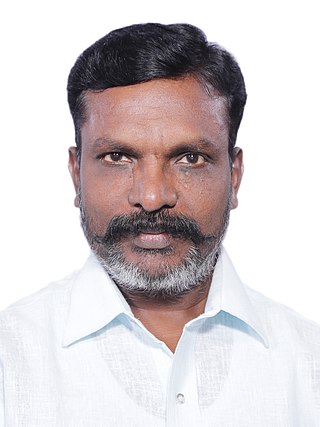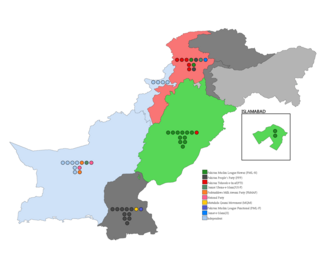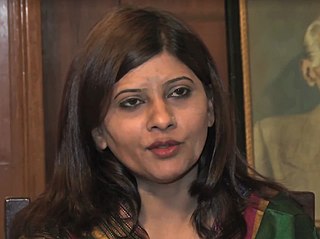
Dalit, also some of them previously known as untouchables, is the lowest stratum of the castes in the Indian subcontinent. Dalits were excluded from the fourfold varna of the caste hierarchy and were seen as forming a fifth varna, also known by the name of Panchama. Several scholars have drawn parallels between Dalits and the Burakumin of Japan, the Baekjeong of Korea and the peasant class of the medieval European feudal system.

Hinduism is the second largest religious affiliation in Pakistan after Islam. While Hinduism was one of the dominant faiths in the region a few centuries back, today Hindus account for only 2.14% of Pakistan's population or about 4.4 million people according to the 2017 Pakistani census. The Umerkot district has the highest percentage of Hindu residents in the country at 52.2%, while Tharparkar district has the most Hindus in absolute numbers at 714,698.
Chuhra, also known as Bhanghi and Balmiki, is a Dalit caste in India and Pakistan. Populated regions include the Punjab region of India and Pakistan, as well as Uttar Pradesh in India, among other parts of the Indian subcontinent such as southern India. Their traditional occupation is sweeping, a "polluting" occupation that caused them to be considered untouchables in the caste system.
Surendar Valasai is a Pakistani Meghwal Dalit journalist from the Tharparkar District. He was a member of Provincial assembly of Sindh on minority reserved seat fr August 2018 to August 2023.

Khipro is a tehsil of Sanghar district. Its headquarters are in Khipro town. It is bounded to the east by India.

The Kolhi is a subgroup of the Koli caste native to Sindh, Pakistan. Kolhis are mostly Hindus but some of them are Koli Christians or Muslim Kolis. They engage in agriculture; most of them are poor peasants and sharecroppers.
The caste system among South Asian Christians often reflects stratification by sect, location, and the caste of their predecessors. There exists evidence to show that Christian individuals have mobility within their respective castes. But, in some cases, social inertia caused by their old traditions and biases against other castes remain, causing caste system to persist among South Asian Christians, to some extent. Christian priests, nuns, Dalits and similar groups are found in India, Pakistan, Bangladesh, and Nepal.

In India, a caste although it's a western stratification arrived from Portuguese word Casta and Latin word castus ,is a social group where membership is decided by birth. Broadly, Indian castes are divided into the Forward Castes, Other Backward Classes, Scheduled Castes, and Scheduled Tribes. Indian Christians and Indian Muslims are also function as castes. With castes separating individuals into different social groups, it follows that each group will have conflicting interests; oftentimes putting those with lower social standing in less favorable positions. An attempt to address this inequality has been the reservation system, which essentially acts as affirmative action to provide representation to caste groups that have been systematically disadvantaged. There have also been other cases where political parties, like the Bahujan Samaj Party (BSP), was formed to challenge the power of the upper castes.

Tholkappiyan Thirumavalavan, better known as Thol. Thirumavalavan is a political leader, scholar and activist from the southern Indian state of Tamil Nadu. He is a Member of Parliament from Chidambaram. Leader and President of Viduthalai Chiruthaigal Katchi. He rose to prominence in the 1990s as a bahujan leader, and formally entered politics in 1999. His political platform centres on ending caste-based discrimination and consequently the caste system. He has also expressed support for Tamil nationalist movements in Sri Lanka.
Arbab Ghulam Rahim is a Pakistani politician who served as the Chief Minister of the Government of Sindh from 2004 until 2007.
Persecution and discrimination against Dalits has been observed in the countries such as Bangladesh, India, Pakistan, Nepal, the UK, and the US.

The Vagri are a tribe and caste found in the states of Rajasthan and Gujarat in India, and in the province of Sindh in Pakistan.
Hingorno is a small town situated in Taluka Sindhri, Mirpur Khas District, Sindh, Pakistan. The town has a population of 35000.The Chairperson of Town Community Hingorno Rukhsan Shar was Chairperson of Hingorno Voice Chairmen Mohd Ismail Shekh 3 Bigest School In Hingorno(1)Govt Higher Secondary School Hingorno(Principal Farooq Brohi)(2)Govt Primary School Braich Noor Mohammad Sher(H.M Ab Razzaque Soomro)(3)Govt Primary School Hingorno(H.M Ahsan Ali Kanhio)'

The triennial Senate Electionsof Pakistan were held on 3 March 2018 to replace 52 retiring senators - half of the Senate's strength - with the winning candidates serving six-year terms. Overall, Pakistan Muslim League (N) came out as the largest party, followed by the Pakistan Peoples Party and the Pakistan Tehreek-e-Insaf. The results of these elections were steeped in controversy due to rampant allegations of horse trading and vote-buying, which lead to the Prime Minister and opposition leader Imran Khan calling for reforms. Prior to this election, PML (N) candidates were declared as independents by the Election Commission of Pakistan owing to a Supreme Court judgment.

Pakistan Hindu Council is a non-profit organization founded in 2005 by Ramesh Kumar Vankwani. The council aims to promote interfaith harmony between various religions.
Abdul Haq is a Muslim cleric and Pakistani politician. He is among the leaders of the Bharchundi Shareef Dargah, and a locally influential figure. Haq was elected to the National Assembly of Pakistan from Constituency NA-200 (Ghotki-I) as a candidate of Pakistan Peoples Party (PPP) in 2008 Pakistani general election. He received 59,022 votes and defeated Khalid Ahmed Khan Lund, a candidate of the Pakistan Muslim League (Q) (PML-Q).

Krishna Kumari Kohli, also known by the nickname Kishoo Bai, is a Pakistani politician who has been the member of the Senate of Pakistan since March 2018. She is the second Hindu woman to hold this position. She is known for her campaigns for women's rights and against bonded labour; and was named as one of the BBC's 100 most influential women in 2018.

In Pakistan, it is estimated that several hundred people belonging to the minority Hindu, Christian, and Sikh communities are kidnapped and forcefully converted or coerced through societal pressures to convert to Islam each year.

Hinduism is the second-largest religion in Sindh, numbering 4.17 million people and comprising 8.73 percent of the province's population in the 2017 Pakistani census. Sindh has the largest population and the highest percentage of Hindus in Pakistan. Sindh has the Shri Ramapir Temple, whose annual festival is the country's second-largest Hindu festival.

The Sindhi Bhils/Bheels are a Sindhinised sub-group of the Bhil people who live in the Sindh, Punjab, and Balochistan provinces of Pakistan. They are one of major Hindu community in the region, and are one of the Hindu groups in Pakistan who are known to not leave Sindh during the Partition of India.














